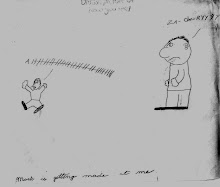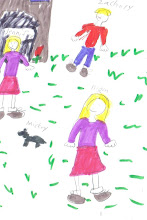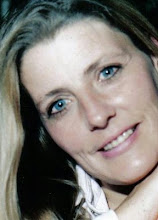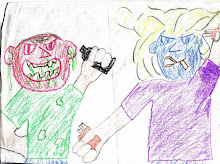http://alterwords.wordpress.com/2008/07/07/why-do-abused-women-stay/
Posted on July 7, 2008 by hysperia
Because this kinda thing happens to them when they leave:
After living quietly for 10 years in the Netherlands as an American granted asylum, Holly Ann Collins is suddenly making headlines in Dutch newspapers and a criminal case growing out of a bitter custody battle refuses to go away.
Collins became a focus of Dutch media attention as a U.S. “refugee” from domestic violence after a neighbor informed the FBI that she was living in Leiden, a town 12 miles from Amsterdam. That tipped off her location to authorities in Minnesota, where parental kidnapping charges against her are still pending from 1994, when she grabbed her three children and fled.
She may be the first American to receive amnesty in the Netherlands; no other case has been documented, according to Dutch newspapers. She was granted asylum in 1997 after she lived for three years in four different camps with Bosnian and Somali war refugees.
Her plight has captivated the international domestic violence community, with advocates, court observers and lawyers sharing the story in long chains of e-mail forwards and word of mouth.
Speaking softly into the phone from her home, Collins said the Dutch judge let her and her children stay in the Netherlands for humanitarian reasons after deciding their safety couldn’t be guaranteed if she returned to the United States.
“Then we were placed in a house, the kids were allowed to go to school and a normal life began,” she told Women’s eNews.
After avoiding the spotlight for more than a decade, she now faces a Minnesota prosecutor pressing ahead with the case against her, even though the Dutch amnesty protects her from deportation and arrest.
If she returns to the United States for trial, as a condition of bail Collins must agree to end all communication with her children, including her oldest who are now in their 20s. She fears that her youngest, Christopher, 13, could be placed into his father’s custody. The older ones would like to return to Massachusetts, a place they consider home.
Collins’ attorney, Alan Rosenfeld, who practices in Louisville, Colo., and has decades of experience defending battered women, picked up the case in March. The family was informed in May that federal kidnapping charges were dropped–although she still faces a federal charge of flight to avoid prosecution–but the state charges still stand.
Rosenfeld says although Collins’ asylum status makes her case unique, he doubts it will set a precedent for other domestic violence victims. Other than her status, it is tragically similar to the hundreds of abuse cases he has seen.
“We as Americans I think are good people and want to believe that our family courts do a good job of protecting children,” Rosenfeld said, “and so we close our eyes real tight in order to keep on believing that.”
Married at 17, Collins says her husband sent her to the hospital three times, bruised and bloody, within the first month of their wedding.
When she was five months pregnant with each child, she says her husband, who told her he didn’t like fat women, beat her more severely. A third pregnancy ended after another blow.
“That was just the way life was,” said Collins, who saw no use in leaving. She says the violence was well documented in court by doctors that treated her and her children.
By the time her next child, Christopher, was born, her husband had filed for divorce, and launched a custody battle. At first she received custody and he was granted visitation rights. Collins returned to him several times thinking the children were safer if she were around. “I really believed that I shouldn’t have left,” she said.
When state child protection officials threatened to charge her with failure to protect her children if she stayed with her abusive husband, she left permanently, received full custody but began to refuse to send the kids on visits to their father after they returned home with bruises.
She was then accused of parental alienation syndrome, a consistently discredited psychological theory where one parent is charged with trying to demonize the other parent. Although the judge acknowledged that Collins and the children were abused, he ruled that her husband’s physical abuse was easier to monitor than Collins’ emotional damage, she said.
“I’m not a likeable person,” Collins said quietly. “I’m whiny and I cry easily, and he’s smiley and happy and pats everyone on the back, and he’s everyone’s friend when you meet him.”
In the end, she lost custody of the two older children, who lived with their father for a year and a half. She was allowed supervised visits, and the children wrote her notes, leaving them in books, the bathroom and the refrigerator. “Help me,” they said, informing her when they would be home alone.
Eventually, she called from a pay phone and told them to meet her at a video store. They drove for an entire day. Collins cut their hair, died it black and slathered them with bronzing skin lotion.
They drove for weeks around the country. They got on a flight to New Zealand. Collins had read about the 1980s case of Elizabeth Morgan, a woman who accused her husband of sexually abusing their daughter and allowed her parents to take her to New Zealand, where they were allowed to stay.
They didn’t make it there and were apprehended during a layover in the Netherlands. While in jail with her children she appealed for asylum. “I just started rattling off everything I’ve seen in movies,” she said, and showed authorities a bag filled with court and medical records.
Following the amnesty, she met and established a new family with a Dutch man. Until six months ago, Collins thought she was the only woman to experience abuse and lose her children. Women started writing to her with their stories, she says, and “then I started feeling a little bit more empowered.”
After Collins permitted her daughter Jennifer to read the court documents, Jennifer became “disgusted,” as she wrote in one of more than 700 e-mails she has sent since November to politicians, advocates and anyone who might help her family.
“I just wanted someone to listen,” she said. “I wanted something to happen.”
But the Minnesota charges remain a concern. Hennepin County prosecuting attorney Elizabeth Cutter said an active warrant is out for Collins’ arrest and plans to prosecute if she steps on U.S. soil.
Rosenfeld, Collins’ lawyer, said talks with the prosecutor stalled after she made a condition of bail that Collins have no contact with her children when she returns to face trial.Cutter said this is a standard condition of bail, because she considers the children to be the crime’s victims.
He is not trying to persuade the authorities to drop charges, however.
“Let’s have all the evidence come out before fair people in Minneapolis,” he said. “If they find her guilty then they punish her. If they find her not guilty, then leave her alone.”
Marna Anderson, executive director of Watch, a program in Minneapolis whose members have observed court hearings for 15 years, said in Hennepin County courts said many of the problems relating to abuse cases persist.
“From what I’ve heard, it’s gotten worse,” she added.
Subscribe to:
Post Comments (Atom)











No comments:
Post a Comment